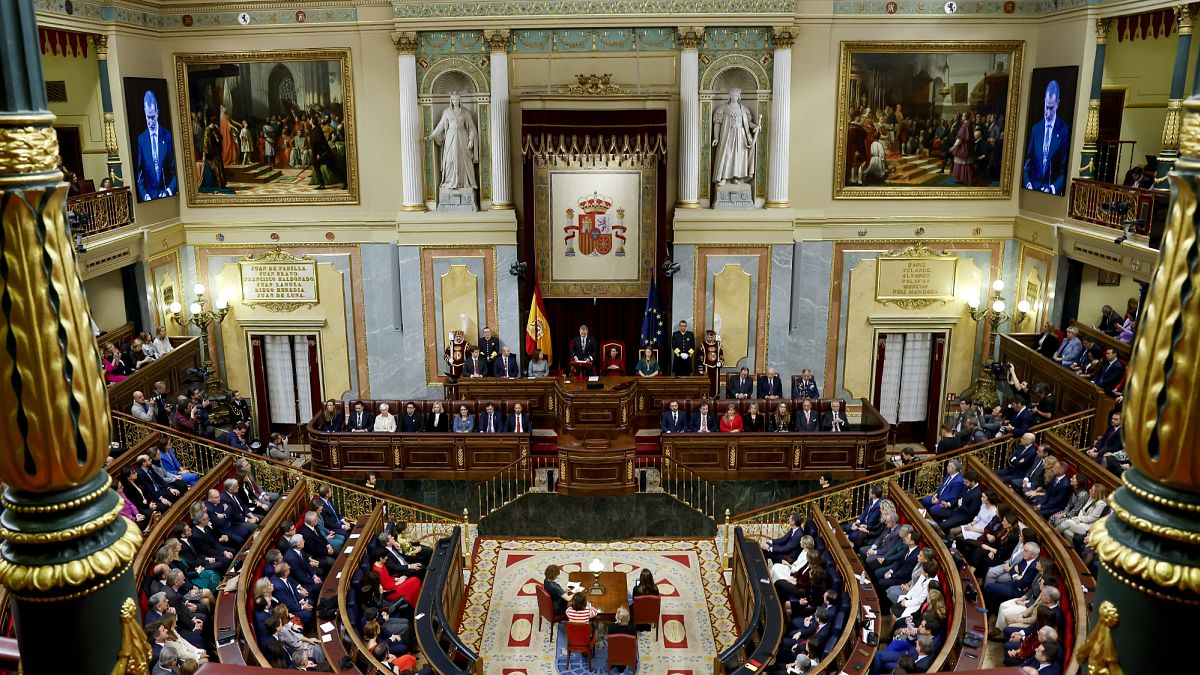The Spanish parliament is considering penalising those who disrupt its press conferences, a week after journalists staged a walkout from a press briefing which descended into chaos after a far-right activist disrupted the session.
Bertrand Ndongo, a political activist and online influencer, refused to cede the floor during a press conference held by Sumar spokesperson, Verónica Barbero, last Tuesday saying “I will not remain silent” as he drowned out the voice of a reporter who was trying to ask a question.
The behaviour of Ndongo, an accredited press member working for the Periodista Digital outlet, led to journalists walking out in protest.
In response to the discord, Spain’s Association of Parliamentary Journalists said it “strongly condemns the behaviour of some individuals accredited to Congress, who continue to disrupt or impede the normal operation of press conferences…and who distort the right to gather and transmit truthful information.”
On Tuesday, the lower chamber of the Spanish parliament debated a proposal to reform its process of press accreditation, after repeated complaints from journalists who argue their ability to do their jobs is being impeded and that they are being harassed.
While the parliamentary discussion of the reform came hot on the heels of last week’s scenes, the issue is longstanding and the draft has been in the works for months. In February, around 80 journalists protested outside Congress against the “unacceptable behaviour” of some of those who are accredited as media representatives, including harassment.
Journalists taking part in February’s protest said they had been threatened with doxxing, the process of having confidential personal information revealed online.
“We, parliamentary journalists, have an obligation to ensure that citizens’ right to information is properly upheld by applying the ethical principles of the profession,” the Association of Parliamentary Journalists said in a statement.
“Recently, journalists working in Congress have suffered insults, abuse, and accusations from accredited individuals who work alongside us and disregard basic rules of social coexistence. They have even threatened to reveal our addresses.”
It added that the disruption by those who disregard these rules “has a direct and negative impact on citizens’ constitutional right to information.”
‘Pseudo-media’
In March, the Socialist Vice President of Congress, Alfonso Rodríguez Gómez de Celis, called on representatives to support efforts to curb the actions of those he accused of posing as media professionals, saying: “The spreaders of hoaxes and hate are eroding our democracy through pseudo-media.”
The reform considered this week would impose sanctions on those who disrespect the parliamentary process, according to the draft document published on Tuesday.
These could range from a temporary, 10-day suspension of credentials for minor infractions, to the cancellation of their parliamentary pass for up to five years, for “uttering insults, discrediting others, or violating the dignity of others,” among other reasons.
Backed by a range of parties, including the centre-left PSOE, the left-wing Sumar, and the Catalan nationalist party, Junts, the legislation only lacked the support of the far-right Vox party and of the centre-right PP, who maintain it amounts to censorship.
Vox spokesperson, Pepa Millán, claimed that the ruling PSOE party “wants to purge” the journalists [Pedro] Sánchez considers hostile.”
PSOE spokesperson, Patxi López, said the reform is backed by associations representing journalists whose work “is being seriously disrupted in the exercise of their right to information by individuals who are dedicated to intimidating, disrespecting, and systematically hindering the work of journalism.”
The move comes at a moment of crisis for vast swathes of traditional media globally, with younger generations increasingly getting their news from social media.
Four in 10 (42%) Europeans between 16 and 30 reported using social media as their primary source of news on political and social issues, according to the latest European Parliament Youth Survey.
The shift has rung alarm bells about the risk of exposure to both misinformation and disinformation, particularly as platforms including X, Facebook and Instagram have downgraded their policies on fact checking.
